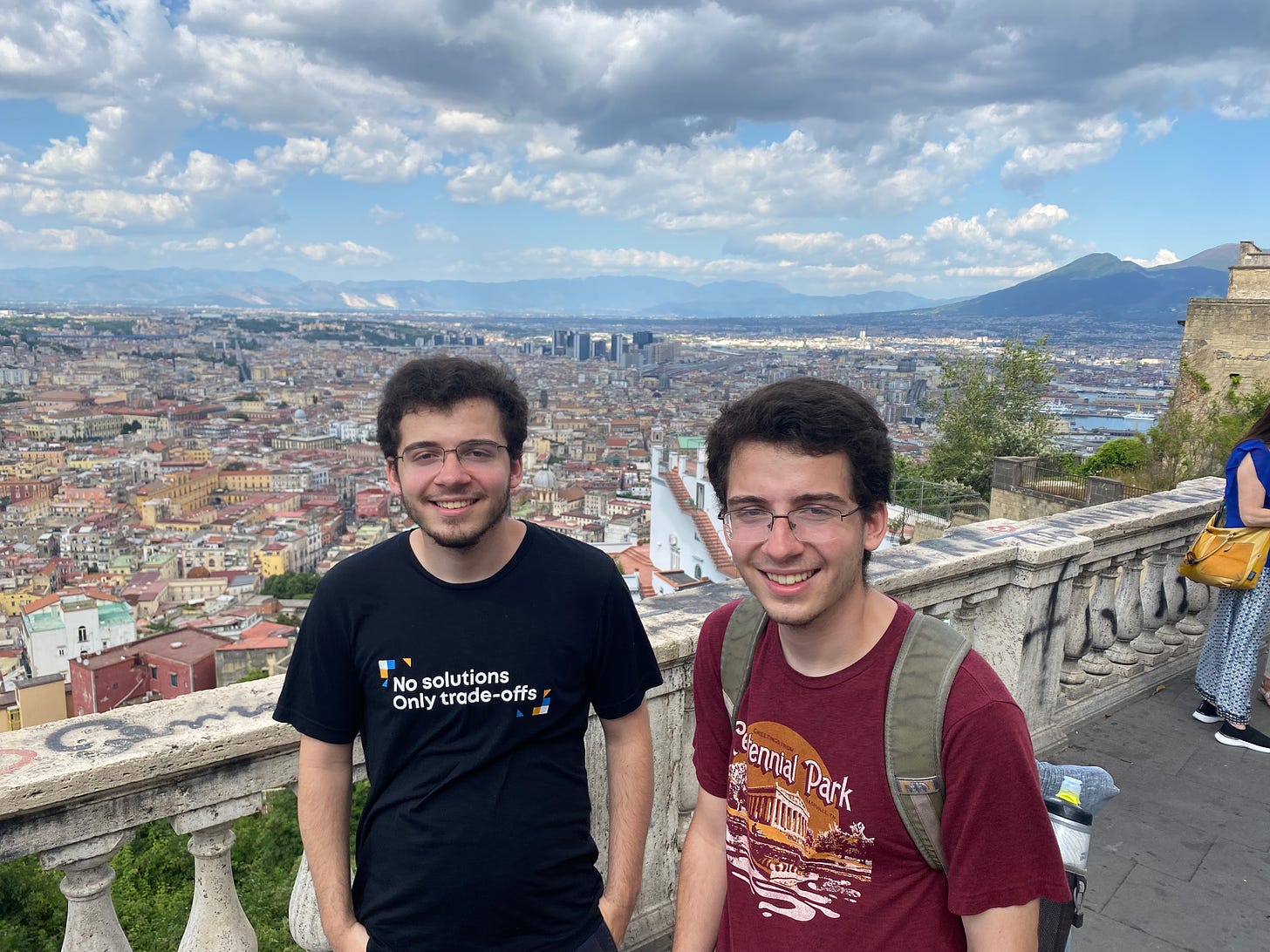
I came to the University of Palermo to teach a quick version of my Economics of Immigration course. Here’s what I learned about migration during my time in Italy:
Sicily’s population has been flat for the last 30 years. The countryside often looks utterly empty. After one wrong turn, we lost sight of not only other cars, but any sign of human habitation for miles around. Italy’s foreign-born population share is just 11%, below the U.S., France, Germany, the U.K., and Spain.
Even so, popular opposition to immigration is strong. Lega Nord, the party that used to push for northern secession from the parasitic south, has rebranded itself as Lega, an anti-immigration party for all Italians. It’s now the biggest party in the Italian Chamber of Deputies - and according to my contacts, becoming big in Sicily despite its history of disdain for the south.
Compared to the U.S., U.K., Germany, Spain, or even France, immigrants seemed poorly integrated into the Italian labor force. Most strikingly, I saw large groups of apparently unemployed young African males hanging out in some of the piazzas of Modena, Parma, and Florence. The most common job for employed Africans was street vending, mostly of products that tourists would only buy out of pity. My assumption was that neither type of migrant was legally able to work, but none of my contacts had much intel on their plight. The African migrants didn’t seem to be homeless, because they disappeared at night and rarely begged. Were they living in refugee centers? Packed into shared apartments?
The unemployed young African males in the piazzas almost surely reinforced Italians’ negative attitudes about migration. Intellectually, this makes little sense: If the Italian government bans migrants from working, it’s silly to blame migrants for being “lazy.” Similarly, if the Italian government keeps migrants on welfare indefinitely, it’s hardly surprising if they’re slow to learn Italian and land a low-skill job. And given Italy’s draconian labor regulation, it’s probably quite hard for migrants to secure legal positions. Emotionally, though, highly visible idle migrants almost surely help Italian nativist parties like Lega win votes.
In Sicily, my contacts told me that mostly-illegal migrant workers have become the backbone of not only Sicilian agriculture, but Sicilian fishing. The migration charity workers that I encountered insisted that migrant farm workers were legal to work in any job, but were somehow “roped-in” to horrifying exploitation. I believe the former, not the latter, but saw nothing probative with my own eyes.
I often told my students that U.S. restriction of immigration in the 1920s was heavily motivated by anti-Italian prejudice. I hoped this would pique their curiosity, but I saw little sign that it did. No one even asked, “What exactly did Americans think was so bad about Italians?”
“The U.S. excluded southern and eastern Europeans because they believed they were inferior. But the subsequent performance of these groups in the U.S. has been average or even above average.” I made this point several times in my class, but how telling is it really? On reflection, quite telling, because the best predictor of future performance is past performance - and that naturally holds for the reliability of judgment. If most native-born Americans a hundred years ago assumed that southern and eastern Europeans - even Jews! - would become a permanent underclass, their judgment must have been very poor. And there’s little reason to deem the judgment of modern native-born Americans on such questions any better.
My students were aware that Italian-Americans were a major demographic, especially on America’s east coast. Their current population is around 18 million, a little less than one-third of the total population of Italy. But the cultural distance is striking. Italians were almost disgusted when I described Italian-American cuisine. The idea of chicken parmesan especially grossed them out.
Both Americans and Italians sense that the south has been losing population to the north. How extreme is the effect? Let’s compare Lombardy, Piedmont, Emilia-Romagna, and Veneto in the far north to Sicily, Calabria, Apulia, and Campania in the far south. From 1991-2021, Lombardy’s population grew 12%, Piedmont’s -1%, Emilia-Romagna’s 13%, and Veneto’s 11%. During the same time, Sicily grew -3%, Calabria -9%, Apulia -3%, and Campania 1%. So we’re talking about roughly .5 percentage-points of divergence per year. Not earth-shattering, but this is despite heavy tax incentives for foreigners to live in the south. Only 30% of foreigners’ income is taxable in most of Italy, but the share drops to just 10% in the south.
If the U.S. had open borders with Italy, how many Italians would come? Since Brexit, the U.S. has become a great option for Anglophone Italians. But as far as I could tell, very few Italians speak fluent English anyway. Even most Italian professors struggle with English. My knee-jerk guess is that the U.S. could siphon off 5% of the population of Italy with 20 years of open borders, though due to diaspora dynamics, that’s probably an understatement.
Meeting Luigi Achilli, the great scholar of human smuggling, was the intellectual highlight of my time in mainland Italy. Long story short: After listening to economically illiterate migration charity workers, I went to Google Scholar to get a better picture. Achilli’s work came out near the top, and I found it both edifying and entertaining. Since his name sounded Italian, I looked him up, and discovered that he was based in Florence. A few weeks later, we were meeting in my hotel lobby. Read his work.
Living in Italy, it’s clear that the U.S., Italians, and humanity suffered a great loss when the U.S. all but banned Italian immigration in the 1920s. Italian-Americans have a much higher standard of living - and contribute much more to the world - than Italians in Italy. Immigration from Italy is a clear-cut immigration success story. The benefits of immigration to Italy, in contrast, seem like they’ve been atypically suppressed by the Italian government’s stubborn commitment to redistribution and labor regulation. Which Italy’s demagogues in turn use to rationalize even more draconian restrictions.









1) I don't think immigration from Latin America is particularly good for the USA, but its a thousand times better then the African and Middle Eastern immigration that Europe is getting. What's going on in Europe is truly a disaster. It's one thing to assimilate a 93 IQ Mestizo with the same religion and some genetic links in them. It's a disaster to try and integrate some 80 something IQ inbred Muslim.
2) "Similarly, if the Italian government keeps migrants on welfare indefinitely, it’s hardly surprising if they’re slow to learn Italian and land a low-skill job."
---
Poor immigrants and their sympathizers are pro-welfare and vote for welfare state parties, so we should blame them for the welfare state.
I believe that poor immigrants largely come to the west for the welfare. Note that things like free education and infrastructure, which the immigrants meager wages could never pay for, count as welfare as well.
3) “What exactly did Americans think was so bad about Italians?”
---
Especially with the Sicilians they were heavily involved in organized crime, something that took many decades to break.
They also were a part of urban political spoils machines that were notorious for their corruption.
4). “The U.S. excluded southern and eastern Europeans because they believed they were inferior. But the subsequent performance of these groups in the U.S. has been average or even above average.” I made this point several times in my class, but how telling is it really? On reflection, quite telling, because the best predictor of future performance is past performance - and that naturally holds for the reliability of judgment. If most native-born Americans a hundred years ago assumed that southern and eastern Europeans - even Jews! - would become a permanent underclass, their judgment must have been very poor. And there’s little reason to deem the judgment of modern native-born Americans on such questions any better."
---
The Bell Curve covers the Ellis Island immigration in its very introduction. Rather than copy paste it in I suggest you just go read it. The topic has been elaborate on by many other sources. Your premise is in question.
There is little correlation between modern third world immigration to the first world and 1900 immigration from Europe to America.
For Italians in particular even if we assumed that Southern Italy has an AVG IQ of 95 we still have to deal with the problem that:
1) Not every Italian immigrant was from the south
2) Immigrants were people who could afford to immigrate (very expensive in 1900 dollars, selection effect)
3) A huge % of immigrants of that era couldn't hack it in America and went back (selection effect)
4) 95 IQ isn't that off from 100 IQ (its basically the same as old stock Scotts Irish).
5) Italians had less cultural, religious, and genetic distance from natives compared to people from another continent
Overall, the 1924 immigration restrictions were a good thing. The US was at the limit of what it could assimilate after a 75 year stretch of ever higher immigration rates of relatively close genetic and cultural cousins. It probably needed a cooling off period to facilitate assimilation, which it did.
----
P.S. You're nonsense about restaurants is nonsense. The whole idea behind Hive Mind is that low skill workers can't substitute for high skill workers in O-Ring sectors. At any price! No comparative advantage. You overcook the fish and it doesn't ruin the restaurant. Meanwhile you make one mistake and you have to throw out 60 million doses of COVID vaccine.
You also misunderstand what a high trust society means. In a low trust society you can only rely on people to do the right thing when its small scale, concrete, everyone is watching, and you will be held accountable. Like a restaurant! In a high trust society you can rely on people to do the right thing at scale, even when it's abstract, even when nobody is watching and its hard to measure, and even when you are the only one holding yourself accountable.
If you want to engage in any activity more complicated than a a restaurant you need a high trust society. That means high trust people. High trust people are only a subset of the world population and nearly all of them already live in the first world.
I taught English in Italy many years ago and was amazed at how weak my pupils' English was. They would claim five years of classroom instruction but could barely manage more than a few hundred words, used very simple phrases, and could not understand anything unfamiliar
I've since travelled and worked a lot in Europe and (controlling for overall education level) Italians' English is easily the worst across the continent.
I don't know what's wrong with how it's taught, but there is huge room for improvement.
It's a big impediment to FDI, and of course successful migration to other countries.